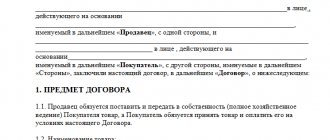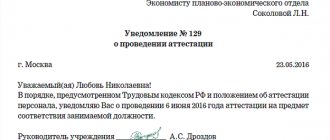Personnel safety is one of the most important responsibilities of organizational leaders. Federal legislation in the field of labor protection regulates standards and prescribes a number of inspections in this regard. These include job evaluations, which must be carried out once every five years. However, if the situation at the enterprise changes, there are grounds for an unscheduled SOUT. This should take place outside the established schedule.
The Ecostar expert laboratory is ready to offer its services for organizing SOUT. We are an accredited company, have our own laboratory and are able to complete the task quickly and competently.
Timing for an unscheduled special assessment of working conditions
To determine the timing of an unscheduled special assessment of working conditions, the following points must be taken into account:
- if the cause was other situations (accident, order of supervisory authorities, etc.), then the inspection is carried out within six months from that moment;
- if an organization has installed new production lines, created new workplaces or changed technological process parameters, it is obliged to conduct a special assessment within 12 months of these changes.
The period is always counted from the moment when the relevant basis comes into force.
Order to conduct SOUT
- approve the report based on the results of the special assessment;
- sign the necessary working documentation (maps, summary statements, etc.);
- within 30 calendar days, submit a declaration to the territorial body of the State Labor Inspectorate (if the workplaces, based on the results of the Special Assessment and Assessment, are recognized as optimal or acceptable or there are no harmful or dangerous production factors);
- no later than 30 calendar days, familiarize employees with the results of the activities carried out against signature;
- no later than 30 calendar days, if there is a website on the Internet, post information about the results of the assessment and the list of measures to improve the working conditions of employees.
- providing the necessary documents and information to the organization’s experts who conduct the special assessment;
- taking measures to prevent any actions that could narrow the range of issues and negatively affect the results of the special assessment;
- informing the enterprise personnel on the issues of holding this event;
- familiarization of enterprise employees with the progress and results of the special assessment.
Grounds for conducting an unscheduled special assessment
An article of the relevant federal law prescribes an unscheduled special assessment of working conditions when certain situations arise:
- new production lines have been launched that change the degree of negative impact on workers;
- new jobs were created at the enterprise;
- new equipment has been installed that changes the parameters of technological or production processes;
- supervisory authorities sent the company an official order;
- an accident occurred at work, or an occupational disease was discovered during a medical examination;
- the quality or characteristics of the raw materials used in production have changed, which may affect the level of negative impact;
- the organization has received new PPE or collective protective equipment;
- the trade union body sent a proposal with compelling reasons to conduct an unscheduled special assessment.
The timing of an unscheduled SOUT directly depends on what was the reason for its organization.
Protocol of the SOUT commission
- information about the organization conducting special assessment work with the obligatory attachment of copies of permits;
- a list of jobs indicating similar places;
- protocols of all studies and measurements performed;
- protocols for assessing the effectiveness of personal protective equipment used at the enterprise;
- Commission protocol on the impossibility of conducting research and (or) measurements at workplaces - filled out in cases where the measurement of harmful factors may lead to a threat to the health or life of experts, testing laboratory workers or other persons involved in the measurements. The protocol must contain an accurate description of the reasons that prevented measurements and (or) research;
- employees' SOUTH cards;
- summary statement of SOUT results;
- recommendations and list of measures to improve working conditions and occupational safety in the workplace;
- expert opinion.
We recommend reading: What documents are needed to receive a tax refund when buying an apartment
The completed protocol of the SOUT commission reflects the decisions and conclusions of the commission on the SOUT, signed by the Chairman of the commission (or his deputy) and the secretary of the commission, no later than the next day after the meeting of the commission.
When an unscheduled SOUT is not needed
It is not always necessary to urgently apply for a special assessment, so company managers should consider Article 17 with particular care. So, unscheduled implementation of SOUT will not be necessary if:
- the accident was the result of the actions of third parties;
- The individual entrepreneur changed his full name;
- the enterprise has undergone reorganization;
- The position occupied by the employee has only changed its name.
An important point that helps determine the need for an unscheduled event is changes in working conditions. If the number of negative factors remains the same and the employee does not feel any changes, then the check will be unnecessary.
However, only a commission created on the basis of an order received from the head of the company can make a certain decision. The commission members will need to analyze the circumstances and, on this basis, conduct or refuse the audit.
The Ecostar expert laboratory has passed the necessary certification and is ready to conduct scheduled and unscheduled assessments of workplaces for your enterprise. For consultation, dial our number and get more information!
How to recognize the results of SOUT when changing the staffing table
How to recognize the results of SOUT when changing the staffing table? The employer renamed the workplace where the SOUT was carried out (conventionally – “manager” to “product manager”), formalizing this with an order “to change the staffing table”, while the employee’s job responsibilities, his location, the equipment used, etc. d. ¬ have not changed. Question: How, in this case, can the results of the SOUTH in the “manager” workplace be recognized as valid for the “product manager” workplace and how can this be formalized correctly?
A commission consisting of a chairman: head of the labor protection service___________ Member of the commission: chief technologist _________________________________________ Member of the commission: head of the technical department _____________________________ In the presence of a welder, product manager _________________________________ Based on information from the personnel management service about the renaming of the position in connection with bringing it to Professional Standard No._____ from “___” __________20___,
Procedure for conducting an unscheduled special assessment of working conditions?
Like a planned special assessment, an unscheduled special assessment of working conditions must be carried out according to a certain algorithm. It represents the following sequence:
- creation of an evaluation commission (this requires a special order from the head of the organization);
- compiling a list of jobs requiring special assessment;
- searching for a performing company and signing a cooperation agreement;
- agreeing on the schedule for completing the special assessment;
- checking the items specified in the list for the influence of negative factors, including laboratory tests;
- creation of a report and its approval by the company’s management;
- transfer of data to supervisory authorities within a month from the date of approval of the received report.
The information is transmitted to the labor inspectorate and the Social Insurance Fund. The latter is necessary so that insurance rates for the organization are calculated correctly.
SOUTH and documentation when changing positions
If both parties agree with the renaming, then the registration is made in accordance with the general rules for changing the employment contract through an additional agreement. On its basis, a corresponding order is issued with the subsequent entry of information about the transformation of the job title into the personal card and into the employee’s work book.
Carrying out an SOUT when changing the title of a position without transforming job responsibilities is not required. Since, in accordance with Part 1 of Article 72. 1 of the Labor Code of the Russian Federation, renaming a position is not considered a transfer, so it can be carried out either by agreement of the parties or at the initiative of the employer.
FAQ:
How does an unscheduled SOUT differ from a planned one?
The employer is required to conduct a planned assessment of workplaces every five years, while an unscheduled assessment of workplaces is carried out in cases described in Article 17 of Federal Law No. 426. Circumstances that may lead to such a need include changes in working conditions and safety of workers. In all other nuances, an unscheduled special assessment does not differ from a planned one - the stages and features of their implementation are similar.
When is it necessary to conduct an unscheduled special assessment of working conditions?
To determine the period for an unscheduled special assessment of working conditions, it is necessary to consider the circumstance due to which such a need arose. If we are talking about changes in technological processes, then the employer has the right to apply for an audit within 12 months from the date of the changes. And if this is an order from supervisory authorities or an accident at work, then the law establishes a six-month period for completing the inspection.
How to properly conduct a special assessment in a company
A special assessment of working conditions in workplaces is carried out in three stages: preparation, examination and reporting. Let's talk about each in more detail.
Stage 1
Prepare documents and find experts
The special assessment is carried out by a commission created by the head of the company. He issues an order and includes in it:
- company details (name, INN, OGRN, legal address);
- the basis for the inspection is Law No. 426-FZ “On Special Assessment of Working Conditions” and Art. 212 Labor Code;
- composition of the commission - chairman and participants;
- terms and schedule for conducting SOUT.
Then the chairman draws up a list of jobs according to the Ministry of Labor form - the experts will need it.
The technical side of the special assessment is carried out by companies accredited by the Ministry of Labor. Choose experts in the Register of organizations conducting SOUT. There you will also find contact information: email, phone numbers and website. The average price for a special assessment of one workplace is 1,300 rubles in Moscow and 800-900 rubles in the regions.
When you choose a contractor for SOUT, enter into an agreement with him. An appendix to it will be a list of jobs - it determines the volume and cost of work.
Stage 2
Invite experts to your office and receive a report
First, experts check the premises, communicate with employees and study work processes. So they decide what research needs to be done, and then agree on the date of the new visit with the commission members.
The second step is measurements. Experts study the level of light and sound, air temperature, and the intensity of thermal radiation. The screening criteria depend on the work processes and tasks of the employees. For example, medical centers can test ultrasound, ultraviolet radiation and magnetic field strength.
In the course of their work, experts draw up special assessment cards, protocols and conclusions. The results are compiled into a report that is submitted to the commission. It contains expert recommendations and a class of working conditions: optimal, acceptable, harmful or dangerous. It depends on them what compensation and allowances employees are entitled to.
The chairman of the commission has 30 days to sign the report and send a copy to the expert organization. She will upload the document to the FSIS SOUT information system so that the labor inspectorate can see the results of the inspection. From this moment the five-year period until a new special assessment is counted.
Stage 3
Fill out the declaration and submit it to the labor inspectorate
If, based on the results of a special assessment of working conditions, experts did not find harmful or dangerous working conditions, fill out a declaration on the form of the Ministry of Labor. It contains the following information:
- company details (name, INN, OGRN, actual and legal address);
- list of employees indicating full name and position;
- details of the expert’s report (number, date of preparation and registration in the FSIS SOUT system);
- details of the expert organization (name and registration number in the register of the Ministry of Labor).
Send the declaration by letter with acknowledgment of receipt or by email to the regional inspectorate of Rostrud. In the second case, sign the document with an electronic digital signature - a simple copy will not be accepted.
If harmful or dangerous conditions are identified as a result of the assessment, there is no need to submit a declaration. Supplement the labor regulations and collective agreement based on the recommendations of experts. And with employees who are entitled to bonuses, sign additional agreements to their employment contracts.
The Ministry of Labor will fine for failure to carry out special assessment procedures
Let us recall that according to the Labor Code, an employee has the right to a workplace that meets state regulatory requirements for labor protection and the conditions provided for by the collective agreement (Article 21 of the Labor Code of the Russian Federation).
SOUTH must be carried out at all workplaces, even those where there is no “harmful” factor (for example, the workplace of an accountant, manager, director), with some exceptions (see below). In relation to workplaces that are recognized as similar, it is sufficient to carry out an assessment assessment only for 20% of such workplaces (but not less than two workplaces). Therefore, the assessment results will be distributed automatically to other workplaces (Article 9 of Law No. 426-FZ).




